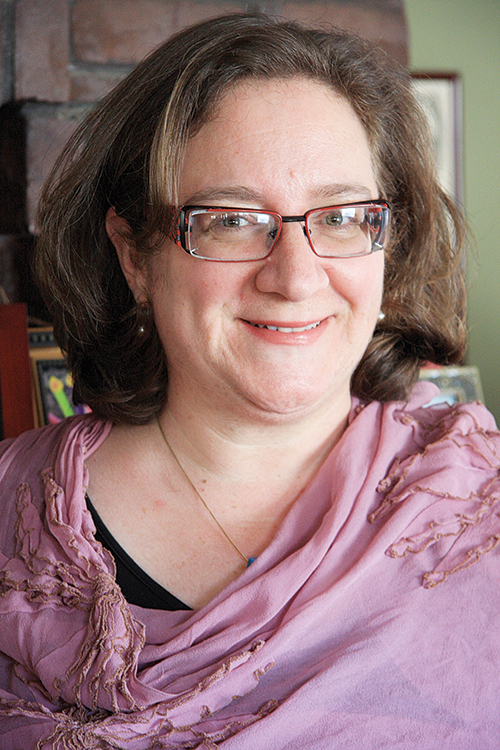
How did average folks in the ancient world find a sense of community, and how would knowing about their day-to-day routines illuminate the connections between their lives and our own?
Dr. Sharon Gerstel specializes in this kind of thing. Her lecture this Friday, “Landscapes of the Late Byzantine Village and Monastary: A View from the Morea,” will explore the evolving landscape of the Morea, the medieval Peloponnese—a region we would now call southern Greece.
The term “Byzantine” comes from “Byzantium,” an early name for the city of Constantinople (now Istanbul) and is used to describe the later years of the Roman Empire.
Gerstel, a professor of Byzantine art history and archaeology at the University of California, Los Angeles, focuses on the intersection of ritual and art in her work.
Her knowledge of underexplored aspects of the period, such as landscape and monument painting, sets her apart from others in her field. She is the author and editor of many books on archaeology and won a Guggenheim Fellowship in 2011.
Gerstel is excited to visit Portland for the first time, and she looks forward to bringing her topics of interest to Portland State.
“I’m interested in looking at the Morea, a very famous region, and thinking about how the landscape has been inhabited by different groups of people,” Gerstel said. “I’m looking at the pieces of evidence—of art and archeology—to understand the communication, how people lived, interacted and…cohabited.
“I will show images of skeletons and excavated trenches and also look at the land,” Gerstel continued. “People will walk away from this lecture knowing a lot about this microregion.”
Gerstel has personally been involved in excavations in Greece as a field director and ceramics specialist, and her personal interest was triggered by a memorable undergraduate professor who loved Byzantine studies.
“I burst into tears when he taught the Fourth Crusade,” Gerstel said.
Gerstel is clearly an academic who knows the human side of historical study and its capacity to move and inspire.
“I think the lecture will be exciting for several reasons,” said Karen Carr, president of the Portland chapter of the Archaeological Institute of America, which is also sponsoring the event. “Firstly, she works on landscape, which is a relatively new and exciting area in archaeology. It’s so important to consider the relationships among sites, and not just each site in isolation. People live in communities and organizations, and Gerstel is doing important work figuring out how people thought about their surroundings. How did their religion—and the monasteries that represented it—help people in southern Greece to build a sense of community?” Carr asked.
“Second, she writes about ordinary people,” Carr continued. “We know so much more about rich people, palaces, forts, temples and churches than we do about villages and villagers. And yet most people in the ancient world were farmers. I’m looking forward to a chance to hear more about those farmers.”
As is so often the question with historical lectures, how does this apply to us today?
“Greece is a country in crisis right now,” Carr said, “and the more we know about the past, and how people have dealt with crises there before, the more we can see what would be good responses to the crises now.”
Friday’s event is presented by the Middle East Studies Center Lecture Series and co-sponsored by the Department of History and the Portland chapter of the Archaeological Institute of America.
The Middle East Studies Center is an interdisciplinary hub on campus for students, faculty and staff with an interest in the Middle East, located in East Hall, room 318.
“Our work on campus includes supporting faculty members doing work on the Middle East as well as supporting students with resources and scholarships,” said Elisheva Cohen, the center’s outreach coordinator.
“Three years ago, [the MESC] was designated a national resource center by the Title VI program of the federal government,” Cohen said. “This gives us the mandate to work on and off campus to promote and share knowledge about the Middle East.
Landscapes of the Late Byzantine Village and Monastery: A View from the Morea
Friday, May 17, 7:30 p.m.
PSU School of Business Administration auditorium, room 190
Free and open to the public
“We do that by hosting public lectures such as this one, as well as film screenings and panel discussions,” Cohen said.
Gerstel’s lecture will give attendees some in-depth knowledge about the way people lived in a much-discussed historical era, and will also illustrate the way they organized their lives among the villages and monasteries of the time.
Even if you are not an art history or archaeology student, what could be cooler than getting to see the everyday treasures of bygone civilizations?
The lecture’s abstract gets into this mythopoetic side of things, noting that the Morea region has “been romanticized in myths of the Crusades and lamented in Greek songs of loss.”
Duly noted: This topic has been fascinating humans for quite some time.

